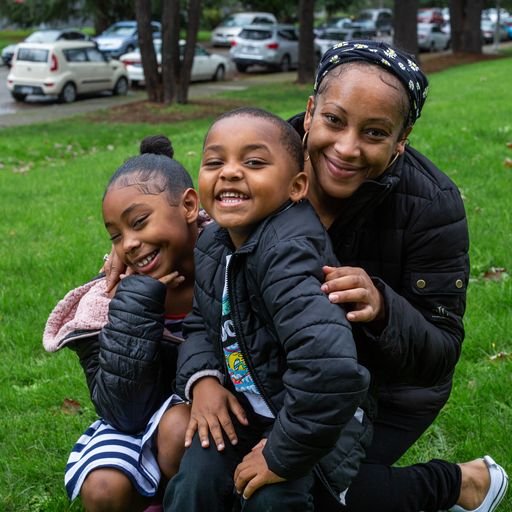Mothering is essential work, and mothering is on all of us
Our mothers, whether by blood or bond, are with us today.
Their hands, the ones that taught us care, are always with us, and we are extensions of them.
We were shaped by and are remnants of their values, and we embody their joy, spirit, and nurturing in our daily lives. We knew and know their chest as a place for surrender and their arms as comforting as soul food. Undoubtedly, their love has grounded us. As we’ve grown, learned, contended with, and navigated this tumultuous world, they have been our home base and safe place.
With Mothers’ Day season underway, we honor the mothers who loved us into bravery, who inspired us to dream expansively and pursue every possibility we’ve claimed for ourselves. The Black Future Co-op team stands on the shoulders of women who collectively instilled in us the understanding that care is the precursor for trust, which is critical in our work toward liberation.
As we celebrate Black motherly love this May, we call attention to their physical, social, and emotional labor in the face of structurally harmful systems fortified by narrative violence. We owe it to all Black mothers to secure a well-being that is rooted in the truth of their lived experiences and enables us to pour back into them.
How We Care for Black Mothers
The care of Black mothers and motherly figures should set a precedent for how we care for them, but that is not the case across the country.
In the United States, the Black motherhood experience is shaped by compounding racist systems that our communities are forced to navigate. It always starts with the structural. Studies assessing the impact of bias and discriminatory practices on Black health and well-being show that our communities have been redlined and effectively barred from high-quality healthcare services, resulting in poorer health outcomes. For Black women, this has meant a higher prevalence of heart disease, stroke, cancers, diabetes, and stress (CDC, 2018). For Black mothers, this also has meant a festering maternal health crisis where Black women are three times more likely to die from a pregnancy-related cause than non-Hispanic white women, regardless of income (CDC, 2021).
In Washington state, Black mothers are consistently failed by systems across sectors, working in tandem to harm our communities. Cesarean section deliveries, for example, cost women roughly $11,800 compared to an estimated $8,600 for a vaginal birth. Despite facilitating higher rates of maternal mortality and morbidity, from 2018 to 2020, the C-section delivery rates for Black women were higher than the statewide average for all women (Black Well-being: Moving Toward Solutions, 2022).
The numbers don’t come close to capturing the stories we hold around these experiences. The antidote is grounded in our own wisdom. The approaches outlined by Black Washingtonians in the Black Well-being: Moving Toward Solutions Together report are built on the truth of our lived experiences and present action steps to disrupt the harm. We must put all we can into bringing forth the systems that ensure Black mothers are always cared for.
The Stereotypes Behind the Systemic Failure
Underpinning the systemic violence waged on Black mothers is the narrative violence that has long fortified it.
In the Geena Davis Institute on Gender in Media’s 2021 analysis of Black women’s depictions in Hollywood, they categorically name the racist roots of the three stereotypes often aired and amplified in the media. The ‘sapphire’ stereotype, traced back to a minstrel showrunner’s radio show, is projected as strong, controlling, and aggressive. The ‘mammy’ stereotype is framed as nurturing and submissive and stems from the era of slavery when Black women were often caretakers of white children. Hattie McDaniels played the role of ‘Mammy’ in a movie that earned her an Academy Award. Hollywood deemed her character award-worthy despite it not being complex enough to have agency or even given a proper name. The third stereotype, the jezebel,’ stems from a hypersexualization of Black women envisioned by racists to be in direct contrast to the modest and pure white woman. Throughout America’s history, this stereotype has been enlisted to enable and justify the violation of Black women.
We take up space intentionally in naming the stereotypes and biases the media underscores daily with narratives seen in the 24-hour news cycle. Narrative violence supports the hardwiring of bias in this culture’s fibers, the health sector’s systems, and in our state’s hospitals.
The harmful narratives have made the inadequate care of Black mothers the standard in healthcare organizations across the country. All care providers are recipients of this narrative programming, which affects how they and their institutions engage with Black mothers.
In an essay published as part of Free Press’ Media 2070 project, the writers prompt us to imagine a world where media reparations are real, asking, “What would it look like if we had a media system where Black people were able to create and control the distribution of our own stories and narratives?” We envision that media system to be committed to a truthful narrative that defines Black women by their multifaceted strengths rather than the harmful inaccuracies summoned by racist structures that refuse them decency and support.
Attaining the Care Black Mothers Deserve
Ensuring Black mothers get the care they deserve is on all of us, and it is a shared responsibility that demands our collective brilliance and continual commitment. In community, Black Washingtonians have called for the creation of community-led accountability mechanisms to report incidents of racism that impact facilities’ licensure, a decolonizing of medical training materials and approaches, and more social policies that expressly name an intention to address racism. To this end, Tubman Center for Health & Freedom has already created a medical racism reporting line, called the “Tubman Tapes.” These approaches, in effect, expand the definition of care beyond immediate needs and crises to include tending to all parts that influence Black mothers’ well-being.
Explore how We See You grantees serve Black mothers in communities across Washington state.

